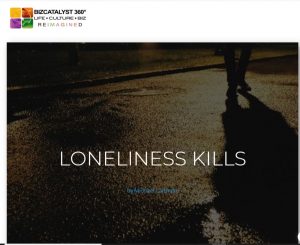
Afew days ago, a young man in Israel, a school teacher, killed himself. He had students, he had tenure, he was healthy, handsome, eloquent, and he was lonely. In a Facebook post, he wrote his final note: “It is not good for the man to be alone; loneliness kills. Another day, another week, another month, another year goes by and I’m alone. At lunch, at work, in the evening, on weekends, on holidays, and on birthdays that no one remembers. The few friends have gone, faded in time; it is time to leave.”
That man was not unique in his emotions. His words on social media capture the curse of our time: We are all connected, yet so alone. Loneliness has become so heavy these days precisely because we should have been so much more connected than we are.
We’re so late in our development. By now, we should have been a connected humanity that feels that we are one system whose parts complement each other and reciprocate with one another for the sake of humankind and all of nature. Instead, until just recently, we have been immersed up to our necks in the quagmire of mutual destruction that we proudly (and mistakenly) called “capitalistic economy” and “progress.”
Suddenly, when Covid-19 came along and forced us to take a break from mutual annihilation, we began to feel the emptiness we have inside. But what else could we have within us? When everyone hates and fears everyone else to the point that you stop talking and communicate by texting, and you build around you walls of false confidence and fake smiles to hide your insecurity, when suddenly you are alone, you realize that you have no idea who you are, how to be with yourself, or what you really want because you have been busy all your life erecting walls against the hostile outside world. And no one calls because they’re all in the same situation: Everyone is lonely and afraid of being hurt.
Being alone means you are ignored, that people don’t care about you, so some people prefer to end their lives as long as at some point, even if it’s their final moment, somebody will care.
Why We Can’t Connect
Humanity is different from all other parts of nature in that we must evolve of our own accord. Our evolution is far less physical compared to other species, and far more emotional, intellectual, and social. At the height of our evolution, we are intended to experience the wholeness of the system we call the “universe.”
In human society, just as a human infant, we have to learn one step at a time how to become social beings and how to build a good society for ourselves.
Nature develops all other elements besides humanity through instincts. Humans are largely devoid of them. When an animal is born, it immediately knows where to find food, can often walk within a few hours, and generally behaves like any other animal of its kind. Humans, on the other hand, can barely move their hands and legs when they are born, and remain utterly helpless for years. Humans, unlike animals, have to gain their knowledge by themselves through hard work. In human society, just as a human infant, we have to learn one step at a time how to become social beings and how to build a good society for ourselves. We are evolving through our own desire to improve our situation. And we are not evolving randomly, but in a clear direction: toward greater cohesion, greater care for one another, greater mutual responsibility, and eventually to love for one another.
When a child is hungry, it cries because an empty stomach feels bad. When a person is lonely, he cries because an empty heart feels very, very bad. Heartache hurts much more than an empty stomach.
But the loneliness so many feel today is not the end. It’s the beginning. It’s the darkness before the dawn. Now we are beginning to realize that we must transform everything, and first and foremost our relationships. To make a change, we have to feel that the present is unbearable. And nothing is more unbearable than loneliness.
We can prevent such tragedies as suicide because of loneliness if we stop insisting on returning to our previous, backward state of “free” economy that is reined by egoism, and start advancing to the state of mutual concern and empathy we should have been in long ago. Along the way, we will discover that it’s not only better to care for each other than fear one another, it is also how all of reality works but us, until we, too, reach that state.
Featured in BizCatalyst, Facebook, LinkedIn